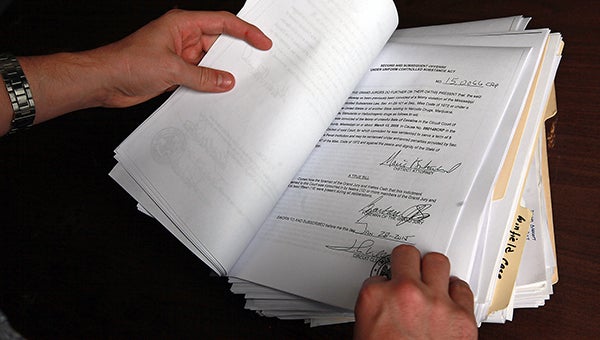Newspapers serve as guardians of the public’s right to know
Published 11:01 am Thursday, October 8, 2015

- FOIA: Public documents are frequently obtained by The Vicksburg Post using the Freedom of Information Act to help report on what happens in local city and county government. (Justin Sellers/The Vicksburg Post)
In the Mississippi Code, they’re known as Title 41: Open meetings, and Title 61: Public access to public records.
Together, they form what is commonly known as the “Sunshine Law,” a collection of regulations that guarantee the public’s access to meetings of the Legislature, the Board of Supervisors, the Board of Mayor and Aldermen and the boards and commissions they appoint, and any records they keep or generate as part of their activities. It is also a tool newspapers use in their roles as the public’s watchdog; the public’s eyes and ears into local government and how it functions. It’s a role the press takes very seriously.
“The public depends on the newspaper to keep them informed, and I think the newspaper has a tremendous responsibility to inform and at the same time, do it as impartial as possible,” South Ward Alderman Willis Thompson said. “A lot of people read the newspaper to keep them informed of what’s going on. A lot of people I talk to reference the newspaper a lot.”
“You highlight information provided at the board meetings so people who don’t see TV 23 (the city’s local broadcast channel) or come to the board meetings will have an understanding of what the city’s doing,” City Attorney Nancy Thomas said. “That’s the main way people find out what the city’s doing.”
Newspapers, City Accounting Director Dough Whittington said, “are the main source of news for people.”
How a newspaper goes about its duties involves more than just a reporter showing up at meetings and recording what goes on.
Sometimes, it requires going back to previous articles to provide background to show why a public body acted the way it did or to show why it refused to act.
Other times, it requires using the state laws as a hammer to break down walls and challenge a board’s decision to go into executive session or to require officials to produce public records that can explain why a certain action by a board can be detrimental to a community.
Mississippi’s open meetings act requires all meetings of elected and appointed boards to be open to the public and restricts the reason a board can go into executive, or closed session. Under the law, before a board can go into closed session, it must give the reason for doing so and it must give some description of that reason to show why it must be discussed in closed session.
The public records act lists as public records all materials used and maintained in the business of operating government. That includes invoices that show how money is being spent, public employees’ salaries, contracts between public bodies and private companies, budgets, meeting minutes — including minutes of closed sessions, and other items involving the business of government.
While seeing a public record is a right under the law, some local governments require people asking to see the records to fill out a request they keep on record, and sometimes charge a fee to retrieve or copy the records.
Sometimes, an experienced reporter is able to get a public record without going through the application process by knowing the right source.
“I hold the newspaper in high regard, because they can normally get into places the average person can’t and get information,” Thompson said. “Any time you’re in a position where you can influence people, I think that’s a powerful position.”
North Ward Alderman Michael Mayfield said newspapers do a good job of keeping citizens informed and aware of the know what is going on in the city.
“A lot of times things we take care of in official meeting are reported to the public and keeps them informed on what their city government is doing and what it means to them,” he said. “There have been times I didn’t particularly like editorials or opinions or personal opinions, but as a public official, that’s something I have to live and die with.”






